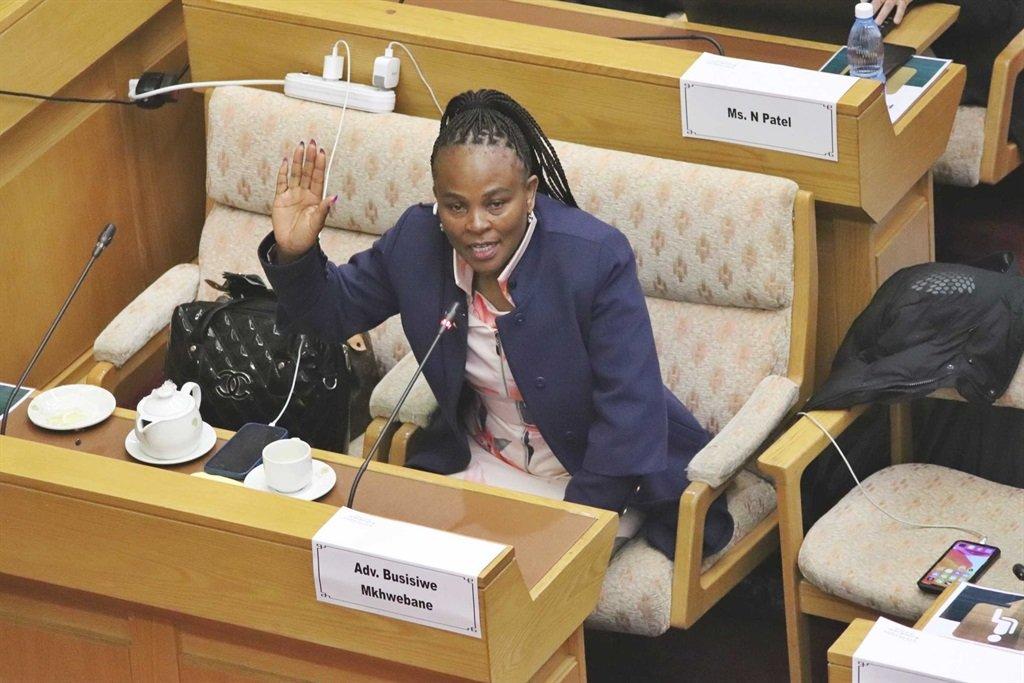Africa-Press – South-Africa. A former senior investigator at the Public Protector dropped bombshell after bombshell about the conduct of Busisiwe Mkhwebane in the investigations into the SA Reserve Bank (SARB) and Vrede dairy farm.
Former senior investigator Tebogo Kekana testified before the National Assembly’s Section 194 Committee on Monday.
Kekana’s testimony was based on an affidavit he deposed under the Protected Disclosures Act in 2019.
While the Public Protector was investigating the SARB, he was present at a meeting between Mkhwebane, then-State Security Agency (SSA) director-general Arthur Fraser, SSA representative James Ramabulana and then-state security minister David Mahlobo. This meeting took place on 3 May 2017.
Stalingrad has fallen: Acting Public Protector to withdraw Mkhwebane’s court applications
“On the day of the meeting, I was informed that advocate Mkhwebane was having a discussion with Minister Mahlobo prior to the meeting. I was not party to this discussion. I found it odd that advocate Mkhwebane would hold a discussion by herself with one of the attendees of an interview, without anyone else present,” read the affidavit.
“The formal meeting then began. When the meeting with the SSA began, I took out my notepad in order to take notes of the meeting and took out my recording device in order to record the meeting [as I usually do].
“Advocate Mkhwebane, however, instructed me not to record the meeting. She also instructed me not to take notes during the meeting. I was extremely surprised by both these instructions.”
Kekana said he typically recorded meetings or took notes. Mkhwebane did not provide a reason on why he should not take notes.
Mkhwebane impeachment: Public Protector mustn’t put own interests ahead of the public’s, committee hears
When he was drafting the report on the SARB matter, Mkhwebane told him to find a way to include a recommendation the Constitution should be amended to nationalise the SARB.
Kekana did not include it in the report, because he did not believe it was relevant to the investigation. Mkhwebane never informed him of “what purpose or motive such a recommendation would serve”, he said.
Kekana added he prepared several versions of the draft final report, none of which included a recommendation the SARB should be nationalised, a recommendation he found “bizarre”.
On 4 May 2017, Mkhwebane provided him with her comments on the draft report in an email.
Mkhwebane’s comments were typed in capital letters in the email.
“As can be seen from this email, Advocate Mkhwebane instructs me to ‘AMEND THE CONSTITUTION TO CATER FOR STATE BANK PER GOODSON PROPOSAL’.
Goodson is economist Stephen Goodson whom Mkhwebane met after a provisional report was leaked. He was a proponent of nationalising the SARB. She also instructed Kekana to read Goodson’s book on the topic.
Mkhwebane then informed him the SSA would draft a recommendation to nationalise the SARB.
On 6 June 2017, Kekana and Mkhwebane again met SSA representatives Mai Moodley and Ramabulana.
Moodley was introduced to him by Mkhwebane as an economist who would assist with the constitutional amendment recommendation for the report.
“During this meeting, Mr Moodley produced a single page which contained a draft of proposed recommendations which were to be inserted into the final report,” read the affidavit.
Upon Mkhwebane’s instruction, he included it in the report, which was published on 19 June 2017.
“Accordingly, the remedial action contained in the final CIEX investigation report did not come from the Office of the Public Protector, but rather from the SSA.”
Mkhwebane asks for time to explain, after Mpofu admits her ‘unlawful possession’ of classified report
The report was successfully challenged in court.
Kekana testified Mkhwebane told him she did not want all the drafts of the CIEX report in the Rule 53 record (the rule requiring all relevant documents to be included in the court record).
Mkhwebane’s counsel at the time did not agree, indicating everything had to be included in the record.
Mkhwebane subsequently changed legal representation.
In November 2017, Kekana was called in by a senior HR manager and told Mkhwebane did not want him working in her office because he spoke too much to the lawyers.
Kekana subsequently worked on the report into the Gupta-linked Vrede dairy farm.
He told the committee his supervisor said Mkhwebane instructed them not to make use of the information contained in the GuptaLeaks – a massive tranche of leaked emails that detailed the Guptas’ dealings.
Furthermore, Mkhwebane also instructed them- through his supervisor – there should be no findings against politicians in the report.
“We were accordingly forced to remove any adverse findings contained in the report against any politician, including Mr Ace Magashule, the premier of the Free State at the relevant time, and Mr Mosebenzi Zwane, who was the MEC for the Free State Department of Agriculture at the time,” read Kekana’s affidavit.
“She said she didn’t care if the report was reviewed or not,” Kekana said.
His laptop was later confiscated, when he got it back, his email correspondence with Mkhwebane was gone.
Kekana was later suspended and fired. The case is in the Labour Court.
Mkhwebane’s legal counsel, advocate Dali Mpofu SC, would cross-examine Kekana later on Monday.
Kekana, Mpofu and Mkhwebane participated via a virtual platform.
For More News And Analysis About South-Africa Follow Africa-Press






